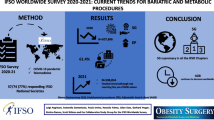Abstract
Background
Metabolic surgery is the most effective method for weight loss in the long-term treatment of morbid obesity and its comorbidities. The primary aim of this study was to examine factors associated with percent total weight loss (%TWL) after metabolic surgery among an ethnically diverse sample of patients.
Methods
A retrospective review was performed on 1012 patients who underwent either a sleeve gastrectomy (SG) or Roux-en-Y gastric bypass (RYGB) at our institution between January 2008 and June 2015.
Results
African Americans had a lower %TWL than non-Hispanic/Latino Whites at 6, 9, 12, 18, and 48 months. At all timeframes, there was a negative association between pre-surgery TWL and %TWL after surgery. Female sex was negatively associated with %TWL at 3 months only. Higher initial BMI was also associated with greater post-operative %TWL at 18, 24 and 36 months. Older patients had lower %TWL at 6, 9, 12 and 24 months post-surgery. Patients who received RYGB had greater %TWL than those who received SG at 3, 6, 9, 12, 24 and 36 months.
Conclusions
African Americans had a lower %TWL than non-Hispanic/Latino Whites at most time points; there were no other significant race/ethnicity or sex differences. BMI (greater initial BMI), age (lower) and RYGB were associated with a greater post-operative %TWL at certain post-surgery follow-up time points. A limitation of this study is that there was missing data at a number of time points due to lack of attendance at certain follow-up visits.

Similar content being viewed by others
References
Wang L, Yao L, Yan P, et al. Robotic versus laparoscopic Roux-en-Y gastric bypass for morbid obesity: a systematic review and meta-analysis. Obes Surg. 2018;28(11):3691–700.
Solomon H, Liu GY, Alami R, et al. Benefits to patients choosing preoperative weight loss in gastric bypass surgery: new results of a randomized trial. J Am Coll Surg. 2009;208(2):241–5.
Wood MH, Carlin AM, Ghaferi AA, Varban OA, Hawasli A, Bonham AJ, et al. Association of race with bariatric surgery outcomes. 2019:e190029-e.
Sheka AC, Kizy S, Wirth K, et al. Racial disparities in perioperative outcomes after bariatric surgery. Surg Obes Relat Dis. 2018;
Wee CC, Jones DB, Apovian C, et al. Weight loss after bariatric surgery: do clinical and behavioral factors explain racial differences? Obes Surg. 2017;27(11):2873–84.
Ng J, Seip R, Stone A, et al. Ethnic variation in weight loss, but not co-morbidity remission, after laparoscopic gastric banding and Roux-en-Y gastric bypass. Surg Obes Relat Dis. 2015;11(1):94–100.
Admiraal WM, Celik F, Gerdes VE, et al. Ethnic differences in weight loss and diabetes remission after bariatric surgery: a meta-analysis. Diabetes Care. 2012;35(9):1951–8.
Cheung LK, Lal LS, Chow DS, et al. Racial disparity in short-term outcomes after gastric bypass surgery. Obes Surg. 2013;23(12):2096–103.
Guidelines (2013) for managing overweight and obesity in adults. Preface to the Expert Panel Report (comprehensive version which includes systematic evidence review, evidence statements, and recommendations). Obesity (Silver Spring, Md). 2014;22 Suppl 2:S40.
Elli E, Gonzalez-Heredia R, Sarvepalli S, et al. Laparoscopic and robotic sleeve gastrectomy: short- and long-term results. Obes Surg. 2015;25(6):967–74.
Bindal V, Gonzalez-Heredia R, Masrur M, et al. Technique evolution, learning curve, and outcomes of 200 robot-assisted gastric bypass procedures: a 5-year experience. Obes Surg. 2015;25(6):997–1002.
Elli EF, Gonzalez-Heredia R, Patel N, et al. Bariatric surgery outcomes in ethnic minorities. Surgery. 2016;160(3):805–12.
Baldridge AS, Pacheco JA, Aufox SA, et al. Factors associated with long-term weight loss following bariatric surgery using 2 methods for repeated measures analysis. Am J Epidemiol. 2015;182(3):235–43.
Tiwari MM, Goede MR, Reynoso JF, et al. Differences in outcomes of laparoscopic gastric bypass. Surg Obes Relat Dis. 2011;7(3):277–82.
Smith E, Layden B, Hassan C, et al. Surgical treatment of obesity in Latinos and African Americans: future directions and recommendations to reduce disparities in bariatric surgery. Bariatric Surg Pract Patient Care. 2018;13(1):2–11.
Wee CC, Huskey KW, Bolcic-Jankovic D, et al. Sex, race, and consideration of bariatric surgery among primary care patients with moderate to severe obesity. J Gen Intern Med. 2014;29(1):68–75.
Andersen JR, Aadland E, Nilsen RM, et al. Predictors of weight loss are different in men and women after sleeve gastrectomy. Obes Surg. 2014;24(4):594–8.
Douglas IJ, Bhaskaran K, Batterham RL, et al. Bariatric surgery in the United Kingdom: a cohort study of weight loss and clinical outcomes in routine clinical care. PLoS Med. 2015;12(12):e1001925-e.
Natvik E, Gjengedal E, Moltu C, Råheim M. Translating weight loss into agency: men’s experiences 5 years after bariatric surgery. International journal of qualitative studies on health and well-being. 2015;10:27729.
Farinholt GN, Carr AD, Chang EJ, et al. A call to arms: obese men with more severe comorbid disease and underutilization of bariatric operations. Surg Endosc. 2013;27(12):4556–63.
Maciejewski ML, Livingston EH, Smith VA, et al. Health expenditures among high-risk patients after gastric bypass and matched controls. Arch Surg. 2012;147(7):633–40.
Benoit SC, Hunter TD, Francis DM, et al. Use of Bariatric Outcomes Longitudinal Database (BOLD) to study variability in patient success after bariatric surgery. Obes Surg. 2014;24(6):936–43.
Chang WW, Hawkins DN, Brockmeyer JR, et al. Factors influencing long-term weight loss after bariatric surgery. Surg Obes Relat Dis. 2019;
Dreber H, Thorell A, Torgerson J, et al. Weight loss, adverse events, and loss to follow-up after gastric bypass in young versus older adults: a Scandinavian Obesity Surgery Registry study. Surg Obes Relat Dis. 2018;14(9):1319–26.
Nickel F, de la Garza JR, Werthmann FS, et al. Predictors of risk and success of obesity surgery. Obes Facts. 2019;12(4):427–39.
Parri A, Benaiges D, Schroder H, et al. Preoperative predictors of weight loss at 4 years following bariatric surgery. Nutr Clin Pract. 2015;30(3):420–4.
Corcelles R, Boules M, Froylich D, et al. Total weight loss as the outcome measure of choice after Roux-en-Y gastric bypass. Obes Surg. 2016;26(8):1794–8.
Livhits M, Mercado C, Yermilov I, et al. Preoperative predictors of weight loss following bariatric surgery: systematic review. Obes Surg. 2012;22(1):70–89.
Cooiman MI, Kleinendorst L, van der Zwaag B, et al. Genetic analysis in the bariatric clinic; impact of a PTEN gene mutation. Mol Genet Genomic Med. 2019;7(6):e00632-e.
Crino A, Fintini D, Bocchini S, et al. Obesity management in Prader-Willi syndrome: current perspectives. Diabetes Metab Syndr Obes. 2018;11:579–93.
Cazzo E, Gestic MA, Utrini MP, Chaim FDM, Cândido EC, Jarolavsky LBdS, et al. Bariatric surgery in individuals with severe cognitive impairment: report of two cases. Sao Paulo Med J 2018;136:84–88.
Melissas J, Stavroulakis K, Tzikoulis V, et al. Sleeve gastrectomy vs Roux-en-Y gastric bypass. Data from IFSO-European Chapter Center of Excellence Program. Obes Surg. 2017;27(4):847–55.
Young MT, Gebhart A, Phelan MJ, et al. Use and outcomes of laparoscopic sleeve gastrectomy vs laparoscopic gastric bypass: analysis of the American College of Surgeons NSQIP. J Am Coll Surg. 2015;220(5):880–5.
Lutz TA, Bueter M. Physiological mechanisms behind Roux-en-Y gastric bypass surgery. Dig Surg. 2014;31(1):13–24.
Osland E, Yunus RM, Khan S, et al. Weight loss outcomes in laparoscopic vertical sleeve gastrectomy (LVSG) versus laparoscopic Roux-en-Y gastric bypass (LRYGB) procedures: a meta-analysis and systematic review of randomized controlled trials. Surg Laparosc Endosc Percutan Tech. 2017;27(1):8–18.
Bhasker AG, Dixon JB, Lakdawala M. Selection of bypass vs sleeve for the management of type-2 diabetes in severely obese: could ethnicity play a role? Obes Surg. 2018;28(10):3073–9.
Acknowledgements
Preliminary data of the paper was previously presented as an E-Poster entitled “Preoperative Weight Loss (POWL) as a Predictor of Percent Excess Weight Loss (%EWL) after Bariatric Surgery” at the 2018 American College of Surgeons Congress in Boston, MA.
Author information
Authors and Affiliations
Corresponding author
Ethics declarations
Conflict of Interest
The authors declare that they have no conflict of interest.
Ethics Statement
All procedures performed in studies involving human participants were in accordance with the ethical standards of the institutional and/or national research committee and with the 1964 Declaration of Helsinki and its later amendments or comparable ethical standards. For this type of study, waiver of informed consent and waiver of authorization were granted by the IRB.
Additional information
Publisher’s Note
Springer Nature remains neutral with regard to jurisdictional claims in published maps and institutional affiliations.
Rights and permissions
About this article
Cite this article
Masrur, M., Bustos, R., Sanchez-Johnsen, L. et al. Factors Associated with Weight Loss After Metabolic Surgery in a Multiethnic Sample of 1012 Patients. OBES SURG 30, 975–981 (2020). https://doi.org/10.1007/s11695-019-04338-w
Published:
Issue Date:
DOI: https://doi.org/10.1007/s11695-019-04338-w




